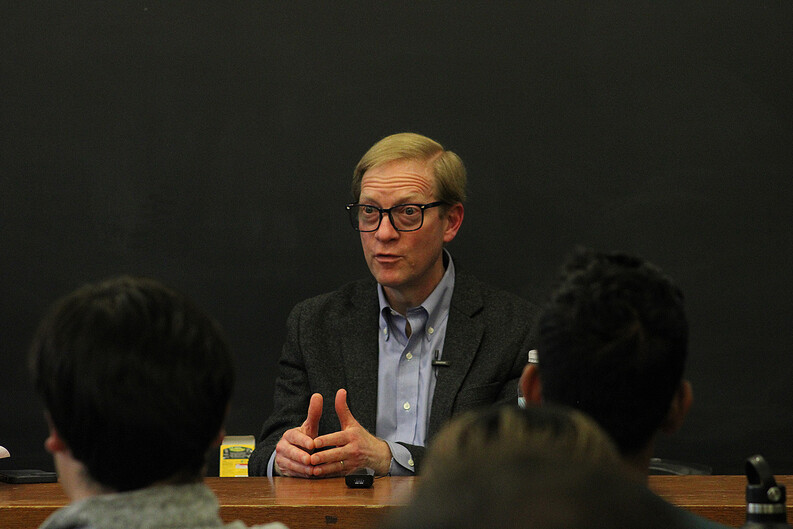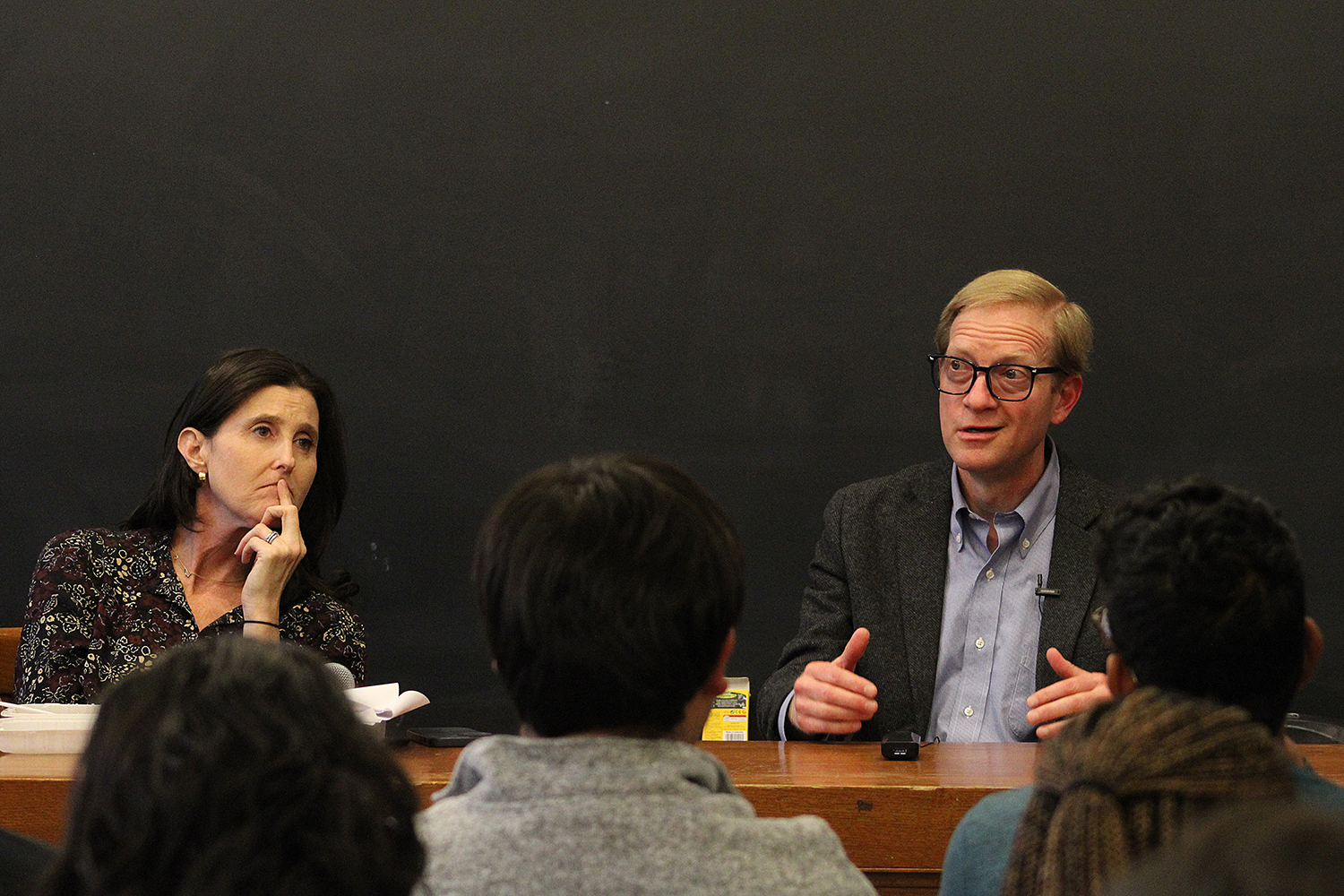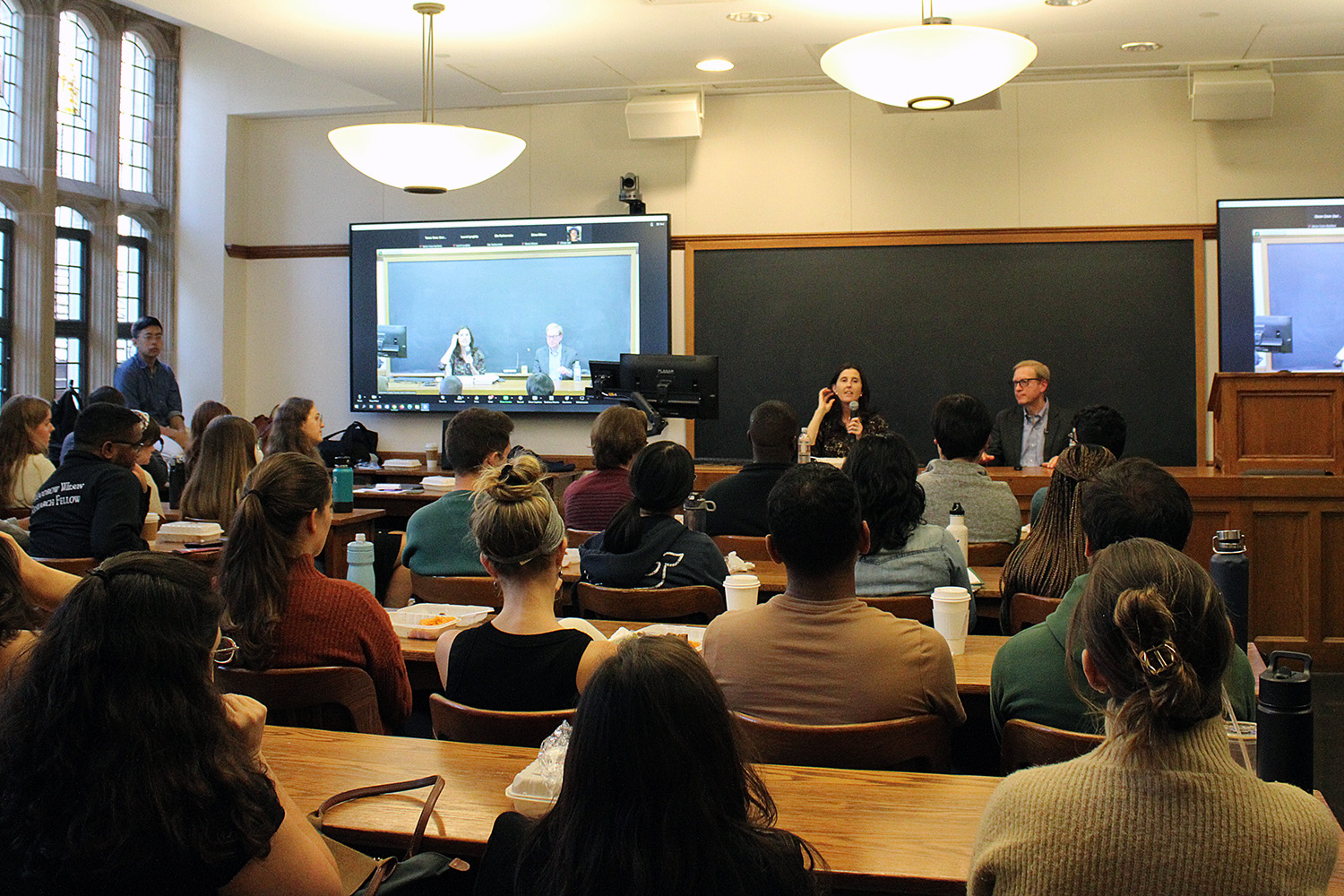Health and Human Services’ Top Lawyer Discusses Health Law Cases Before the Courts

On Oct. 11, the Solomon Center for Health Law and Policy4 hosted Samuel Bagenstos, General Counsel of the U.S. Department of Health and Human Services, for a wide-ranging conversation with Faculty Director Abbe Gluck ’10. Bagenstos discussed court cases involving federal health policy and other matters of health law and policy before closing out the event with questions from students.
Bagenstos began the conversation by saying what it means to be General Counsel of an agency as broad as HHS. He described his work as never repetitive and mattering in many ways. Gluck, the Alfred M. Rankin Professor of Law, then asked him to comment on three cases making their way through the courts.
Bagenstos started with Alliance for Hippocratic Medicine v. FDA, popularly known as the mifepristone case. The case is a challenge to FDA’s approval of the medication abortion drug mifepristone. Bagenstos emphasized that there have been expansive rulings in many of the cases and that all have the potential to impact HHS’ work considerably. He first pointed out that the mifepristone case could have huge implications not only for access to reproductive care but also FDA’s drug approval process. He noted that the District Court adopted a broad theory of standing that, although narrowed somewhat by the Fifth Circuit on appeal, could significantly expand the pool of litigants who can challenge an FDA determination.

Next, Bagenstos then turned to Braidwood v. Becerra, a challenge to the Affordable Care Act (ACA) preventive service requirements. He explained that the case, involves reproductive care access but has mostly been litigated as a case about big structural issues, such as the nondelegation doctrine. The case is currently before the Fifth Circuit.
Lastly, Bagenstos addressed suits brought by pharmaceutical companies challenging the Medicare drug negotiation provision of the Inflation Reduction Act on constitutional grounds. He discussed the constitutional arguments pharmaceutical companies have brought against the law’s drug negotiation provision, which requires pharmaceutical companies to negotiate drug prices with Medicare. Bagenstos said that the government has extremely strong arguments under existing law. For example, drug purchasers — including other parts of the federal government — can already negotiate prices with pharmaceutical companies. In addition, he said, the provision does not obligate companies to sell to Medicare.
According to Bagenstos, pharmaceutical companies will have difficulty arguing that signing an agreement with Medicare on negotiated drug prices qualifies as compelled speech under the First Amendment. He said it would likewise be hard to argue that negotiating drug prices constitutes a taking under the Fifth Amendment.
Gluck then asked Bagenstos to comment on three more topics, starting with the CDC and social media. Bagenstos told the audience that the CDC worked with social media companies to combat public health misinformation during the COVID pandemic before a coalition of state attorney generals brought suit, alleging that the engagement violated the First Amendment. The result was a broad ruling that, though narrowed slightly by the 5th Circuit, greatly limits the federal government’s ability to engage with social media companies. Legal scholars have noted that the case raises complex First Amendment questions: Does the government, public health officials in particular, have a role in disseminating trustworthy information? Where is the line between communication and coercion?
Bagenstos observed that HHS, its agencies staffed with experts backed by evidence-based scientific practices and vast experience, has always seen public communication as one of the central roles of government. The ruling, if not stayed by the Supreme Court, would frustrate HHS’ public health initiatives, he said.
Bagenstos then turned to the next topic, the government’s role in gender-affirming care. He provided an overview of recent litigation on this issue, explaining that the federal government has been involved in cases through both HHS and the Department of Justice. Bagenstos said that the health agency’s position is that bans on gender-affirming care violate the ACA’s anti-discrimination provision, Section 1157, which explicitly prohibits discrimination on the basis of gender identity. Bagenstos predicted that there will be much more development in this litigation the next 12 to 18 months — the 8th Circuit, he noted, just announced that it will be hearing one gender-affirming care case en banc.

Finally, Bagenstos addressed the Supreme Court’s decision to take a case challenging the Chevron doctrine, which holds that courts should defer to a federal agency’s interpretation of an ambiguous statute as long as that interpretation is reasonable. The doctrine stems from the ruling in the 1984 case Chevron v. Natural Resources Defense Council, one of most cited cases in administrative law. Bagenstos discussed the doctrine’s potential end as well as recent changes in general administrative law jurisprudence.
Bagenstos remarked that courts once recognized epistemic, political and institutional benefits to letting agencies decide ambiguities in statutes and regulations. Now, he said, the dominant mode is skepticism. When acting as General Counsel of the Department of Health and Human Services, prudence dictates explaining why the agency’s interpretation of a statute is best, he said. That is because, he explained, even under Chevron, a court may not think a statute is ambiguous. But this ascendant skepticism could lead to the routine second-guessing of agency decisions, he warned — and that would have a far-reaching effect on the healthcare industry and patients. Bagenstos concluded by saying that a strong push will be needed to reinforce the role of agency expertise and principles of deference in administrative law.


